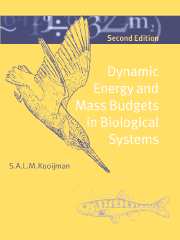Book contents
- Frontmatter
- Contents
- Preface to the second edition
- Preface
- Book organization
- Acknowledgements
- 1 Energetics and models
- 2 Basic concepts
- 3 Energy acquisition and use
- 4 Uptake and use of essential compounds
- 5 Multivariate DEB models
- 6 Uptake and effects of non-essential compounds
- 7 Case studies
- 8 Comparison of species
- 9 Living together
- 10 Evaluation
- Bibliography
- Glossary
- Notation and symbols
- Taxonomic index
- Subject index
Preface
Published online by Cambridge University Press: 12 March 2010
- Frontmatter
- Contents
- Preface to the second edition
- Preface
- Book organization
- Acknowledgements
- 1 Energetics and models
- 2 Basic concepts
- 3 Energy acquisition and use
- 4 Uptake and use of essential compounds
- 5 Multivariate DEB models
- 6 Uptake and effects of non-essential compounds
- 7 Case studies
- 8 Comparison of species
- 9 Living together
- 10 Evaluation
- Bibliography
- Glossary
- Notation and symbols
- Taxonomic index
- Subject index
Summary
In 1978 Thea Adema asked me to develop a statistical methodology for screening toxicants for their effects on daphnid reproduction. I observed that large daphnids tend to have bigger litters than small ones and this led me to realize that reproduction cannot be modelled without including variables such as growth, feeding, food quality and so on. Since then I have found myself working on the theory of Dynamic Energy Budgets (DEB), which has rapidly covered more ground. Twenty years ago, I would not have seen any connection between topics such as feeding of daphnids, embryo development of birds and the behaviour of recycling fermenters. Now, I recognize the intimate relationship between these and many other phenomena and the fundamental role of surface/volume ratios and reserves.
DEB theory is central to eco-energetics, which is the study of the mechanisms involved in the acquisition and use of energy by individuals; this includes the many consequences of the mechanisms of physiological organization, and population and ecosystem dynamics. The related field of bioenergetics focuses on molecular aspects and metabolic pathways in a thermodynamic setting. Although the first and second laws of thermodynamics are frequently used in eco-energetics, thermodynamics is not used to derive rate equations, as is usual, for example, in non-equilibrium thermodynamics. One of the reasons is that the behaviour of individuals cannot be traced back to a restricted number of biochemical reactions. This difference in approach blocks possible cross-fertilizations between levels of organization. This barrier is particularly difficult to break down because eco-energetics usually deals with individuals in a static sense; an individual of a given size allocates energy to different purposes in measured percentages.
- Type
- Chapter
- Information
- Dynamic Energy and Mass Budgets in Biological Systems , pp. xiii - xvPublisher: Cambridge University PressPrint publication year: 2000



